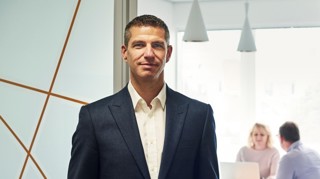[gallery id=1532]
In less than 24 months from now, all new Volvos will be available with electric or hybrid versions, and the manufacturer insists that they will be so safe that no passenger or driver will be seriously injured or killed in one.
 While there may be sceptics out there about how achievable all of that is, it is clear that Volvo is no longer sitting back – spurred on by investment from its Chinese owners Geely, it believes it will be the most progressive and desired premium brand.
While there may be sceptics out there about how achievable all of that is, it is clear that Volvo is no longer sitting back – spurred on by investment from its Chinese owners Geely, it believes it will be the most progressive and desired premium brand.
[gallery id=1532]
2020 will be a big year for Volvo – not only does it aim to have all 101 UK dealerships upgraded to a new corporate identity by then, it wants multi-technician working in its aftersales departments (signing up 300 new technicians along the way) and it is targeting 2% market share, or 60,000 registrations.
In less than 24 months from now, all new Volvos will be available with electric or hybrid versions, and the manufacturer insists that they will be so safe that no passenger or driver will be seriously injured or killed in one.
 While there may be sceptics out there about how achievable all of that is, it is clear that Volvo is no longer sitting back – spurred on by investment from its Chinese owners Geely, it believes it will be the most progressive and desired premium brand.
While there may be sceptics out there about how achievable all of that is, it is clear that Volvo is no longer sitting back – spurred on by investment from its Chinese owners Geely, it believes it will be the most progressive and desired premium brand.
Kevin Meeks, Volvo UK’s customer services director, said: “We could have said we aim to be the most desired, progressive and premium car brand by 2020. But we speak about it in the present tense because it forces us to confront any obstacles that might be in the way.
“For quite a long time, it felt like Volvo was under the radar. If it feels like we’re not now, it’s because of Geely’s involvement. They are absolutely committed to building a global automotive brand.”
Just how sceptical are the dealers about hitting these goals? When Volvo asked them, 78% thought it was achievable.
Volvo then invited them en masse to its new £6 million training and development centre in Daventry. Confidence rose to 87%.
Meeks acknowledged that there is work to do over the next two years, but the centre in Daventry acts as a focal point for making these 2020 plans happen.
He said: “Certainly the ‘progressive and desired’ bit needs more work to get to where we need to be, but in terms of premium we are there.
“We’re on parity with other brands for pricing and residual values.
“Sometimes it’s about us thinking and feeling that way. We’ve been aspiring to the premium sector for so many years, it’s almost like we don’t realise it now we’ve got here. We have a different mindset now to what we had a few years ago.”
Daventry will train new technicians, hosts, product specialists, sales executives and future managers. The centre has its own hosts on staff, six training rooms with digital whiteboards, three webinar rooms, an auditorium for larger training events, 16 service bays and a restaurant.
Meeks also believes that if Volvo is asking dealers to take the next step, then the company has to lead the way with its own facilities and approach.
Volvo is certainly embracing change with what it offers customers (see Care by Volvo on the next page), but what is it expecting of its dealers?
VRE, VPS and MST
Three acronyms reflect most of the core changes Volvo expects of its dealer network.
Volvo Retail Experience (VRE), its latest corporate identity (CI) upgrade, is about turning showrooms into Scandinavian- inspired living-room spaces that are “cool on the outside, warm on the inside”.
![]() Customers park directly in front of the entrance, unlike the traditional dealership style which prioritises stock display above the customer.
Customers park directly in front of the entrance, unlike the traditional dealership style which prioritises stock display above the customer.
The emphasis on customer comfort is due in part to Volvo’s desire for aftersales customers to wait while their car is serviced.
Although Volvo car dealers may still offer courtesy cars, as well as collection and delivery, a new ‘lean’ method of working by multi-skilled teams (MST) of two technicians on each car will mean a service can be completed in under 30 minutes.
Waiting customers can see exactly what is going on in the workshop through showroom windows. A customer’s assigned Volvo Personal Service (VPS) technician will deal with them directly in the ‘living room’ and can escort them into the workshop to see first-hand if any further repairs or maintenance needs have been spotted on their car.
Of the 101 dealers, 42 are now running VPS and 25 have upgraded to VRE. Not all VRE sites are new-builds, with the majority able to upgrade existing facilities to the new standards.
VPS takes nine months to train into the business from start to finish. Meeks acknowledged that it can be quite an upheaval: “You’re pulling things apart from how you would traditionally approach things and then you’re putting it back together again and that takes time.”
Dealers can implement MST before VRE depending on where they are on updating to new standards.
Meeks said: “There will be a minority that won’t be able to make the change to VPS, but the majority of technicians have embraced this and will make the change.”
Volvo's volume ambitions
In the latest SMMT data, Volvo registrations were down 1.2% year-on-year, from 46,696 in 2016 to 46,139 in 2017. This compares with a 2.1% increase for Jaguar at 35,544 and a 3.9% increase for Land Rover on 82,653. While JLR is arguably more established as a premium player, Volvo is still fighting alongside it for market share from Mercedes-Benz, BMW and Audi.
Meeks said Volvo will finish this year closer to 50,000 units and the additional volume the brand is looking for will come through conquest sales with the XC40, Volvo’s range-broadening first small SUV, in its first year on sale and growth across the rest of its product range.
He said there are no volume ambitions being shared beyond 2020, but growth will be organic.
“When we’re talking about 60,000 a year, that’s just new. We’re in danger of ignoring the opportunity with used cars and the necessity for us to do even better in that area,” he added.
Volvo wants dealers to grow approved used car sales by up to between 500-600 units per dealer by 2020 to give a higher level of total throughput.
Meeks would not disclose average return-on-sales figures for the network (in 2014 it was 1.1%), but he said new car margins across the industry are under pressure: “Much as we might bemoan that fact, we can’t get away from it, we have to embrace the environment we are working within.
“It’s only going to get more competitive. It’s not all about the margin you get in each individual new car. The future model will have to be not only through a growth in numbers, but through growth in the diversity of the products and services we offer.
“The traditional model is going to be undermined and we have to be prepared for that.”
Moving into mobility
Meeks said Volvo is aware it will have to be a supplier of mobility in the future, not just products and services. He thinks motor retail will look very different by 2030.
“The provision of product specialists is a natural step in that direction. Fighting about the price is much less relevant because there is a much greater ability to customise monthly payments,” he said.
Meeks said that as consumer behaviour changes, the role of the dealer will naturally change, too. This may mean a reduced role for sales executives and for dealers to be concierge and customer service specialists, facilitating replacement cars, servicing, handovers and deliveries.
He said: “If we keep thinking in traditional terms then we’ll remain part of a traditional industry. We should be thinking more about having a pioneering position in consumer mobility.”
Meeks said the role of the product genius or in Volvo’s case, the product specialist, highlights a whole industry in transition.
“The automotive industry is highly industrialised and all brands have production footprints and volume targets.
“The successful brands will be the ones that effectively marry that up with the opportunity, and the need to have a profitable retailer network.”
Meeks recognises there is a disconnect between recruiting staff not incentivised on volume who work alongside staff who still have volume targets in place.
He said: “That will change over time. It won’t be shutting the door on one approach and going to another.”
Meeks reiterated that Volvo is “fundamentally committed” to an independent franchised dealer network.
He said: “We have an obligation to help them construct a future that is profitable for them.”
Volvo's subscription mobility service
Part of Volvo’s new approach to automotive retail is testing the waters with a new subscription service in London.
Care by Volvo launched on September 21, 2017, and bundles the use of the new XC40 compact SUV with tax, insurance, service, maintenance, tyres, windscreens and a concierge service. Prices start from £629 a month on a 24-month contract.
Insurance covers the driver and two other people. Through the Volvo Car Exchange, customers can also use another Volvo in the range for 14 days a year, such when a customer may need a bigger car like the XC90 for a family holiday.
A 30GB data SIM is also included so drivers can use connectivity features like Spotify and passengers can connect their smart devices.
The concierge service has a dedicated team to help with booking restaurants and hotels, facilitate car exchanges, or even cancelling a booking for a haircut.
Nicola Murphy, Volvo UK direct sales manager who also heads up Care by Volvo in the UK, said: “The target demographic is people that aren’t interested in the traditional ownership model, but they want additional services and use of a vehicle.
“These are likely to be people that may have successful careers or have a very busy family life.”
Care by Volvo is working in partnership with Endeavour Automotive’s Volvo Cars London (VCL). Any delivery, handovers or collections to do with servicing or the car exchange will be facilitated by VCL’s team.
Murphy said as Care by Volvo is in the early stages of its pilot phase the brand is still working through how commission or fees will be attributed between the dealership and the subscription service.
She said: “If Care by Volvo is a success we would of course look to extend it out to a wider area across the UK and with other models. We have to test, learn and scale this accordingly.
“There’s a lot for us to learn and we’re really the first to market with something like this. If it was to expand we would of course have to look very closely about how dealers were involved and to make sure it was just and fair with the dealer network in mind.”
It’s likely Care by Volvo will also act as a test bed for Volvo’s new standalone Polestar luxury brand.
Sales will be online-only when it launches its first 2+2 coupé model in the UK in 2019. However, a spokesman confirmed that the UK dealer network will act as a facilitator in partnership with Polestar for things such as servicing and maintenance.
Another Geely brand, Lynk and Co, will be available in the UK as a car subscription service, but Volvo was unable to comment on whether its dealer network would help facilitate servicing.
Volvo’s sponsored dealer programme
Volvo is preparing to reveal its first sponsored retailer after relaunching the programme two years ago.
It has slightly reshuffled its network over the past 12 months, with four partners leaving the franchise and replaced by solus and multi-site owner drivers, as well as an additional large regional multi-franchise group.
Dealers are on a two-year rolling contract and despite the changes there is still a mix of 55 owners across the 101 dealerships.
Meeks said the network is stable at 101 and Volvo is happy with its geographic coverage.
However, there is a number of people waiting to join the franchise or start as a sponsored retailer.
He said: “There are some hugely talented operators out there that don’t have the huge backing required to set a dealership up, but they have the skills to do it.
“We put a great store on the relationship we have with our dealers, so we’re not going to do a hatchet job on the dealer network to change operators.
“Where dealers have the energy, we will be continuing with them. If a dealer says the future is too difficult, then we would look at new opportunities to work with new partners.”
Login to continue reading
Or register with AM-online to keep up to date with the latest UK automotive retail industry news and insight.




















Login to comment
Comments
No comments have been made yet.